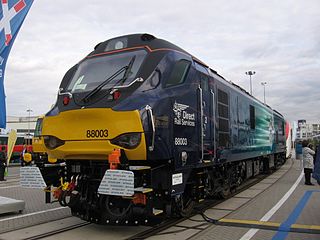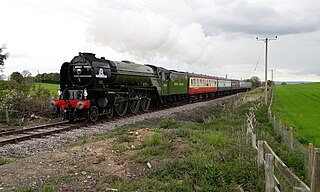
Direct Rail Services (DRS) is a rail freight company in Great Britain, and is one of the publicly owned railway companies in the United Kingdom.

Freightliner Group is a rail freight and logistics company headquartered in the United Kingdom. It is a subsidiary of Genesee & Wyoming.

The Class 66 is a type of six-axle diesel-electric freight locomotive developed in part from the Class 59, for use on UK railways. Since its introduction the class has been successful and has been sold to British and other European railway companies. In Continental Europe it is marketed as the EMD Class 66 (JT42CWR).

The Wensleydale Railway is a heritage railway in Wensleydale and Lower Swaledale in North Yorkshire, England. It was built in stages by different railway companies and originally extended to Garsdale railway station on the Settle-Carlisle line. Since 2003, the remaining line has been run as a heritage railway. The line runs 22 miles (35 km) between Northallerton West station, about a fifteen-minute walk from Northallerton station on the East Coast Main Line, and Redmire.

Crewe Works is a British railway engineering facility located in the town of Crewe, Cheshire. The works, which was originally opened by the Grand Junction Railway in March 1843, employed around 7,000 to 8,000 workers at its peak. In the 1980s much of the engineering works were closed. Most of the site has been redeveloped, but the remaining parts are owned and operated by Alstom.

The British Rail Class 59 is a fleet of Co-Co diesel-electric locomotives built between 1985 and 1995 by the Electro-Motive Division of General Motors for use in Great Britain. A total of 15 locomotives were built for three different operators.

Tinsley was a railway marshalling yard near Tinsley in Sheffield, England, used to separate railway wagons from incoming trains and add them to new trains. It was sited immediately west of the M1 motorway, about one mile north of the Catcliffe junction. It was opened in 1965, as a part of a major plan to rationalise all aspects of the rail services in the Sheffield area; it closed in stages from 1985, with the run-down of rail freight in Britain. It was also the site of Tinsley Traction Maintenance Depot (TMD), which was closed in 1998; at its peak, 200 locomotives were allocated to this depot.

Crewe Diesel Depot is a former diesel-electric locomotive traction maintenance depot, formerly Crewe Diesel Traction Maintenance Depot or Crewe Diesel TMD, situated to the south of and visible from Crewe railway station. Built in 1958 by British Railways it was used as a maintenance facility for the diesel locomotives that were at the time replacing steam traction across the national rail network. Following the privatisation of British Rail depot ownership transferred to EWS, now DB Schenker and continued as a base for diesel traction, latterly becoming a facility for storing surplus rolling stock. In 2014 ownership transferred to Locomotive Storage Limited who have been and are continuing to renovate the site.

Neville Hill is a railway train maintenance depot in Osmondthorpe, Leeds, England on the Leeds to Selby Line. The depot is situated 2 miles 14 chains (3.5 km) to the east of Leeds railway station on the north side of the line.

Tinsley Motive Power Depot, latterly Tinsley Traction Maintenance Depot (TMD), was a railway depot in Tinsley, South Yorkshire, near Sheffield. Access by road was from Brinsworth, near Rotherham. The depot was situated on the freight line between Treeton Junction and the A631 Shepcote Lane.

The British Rail Class 70 is a Co-Co mainline freight GE PowerHaul locomotive series manufactured by General Electric in Erie, Pennsylvania, United States. They are operated in the United Kingdom by Freightliner and Colas Rail. These locomotives replaced the Class 59 as having the highest tractive effort of any Co-Co Diesel locomotive in use in the United Kingdom when they were introduced.
Arriva TrainCare is a railway rolling stock maintenance company. It is presently a wholly-owned subsidiary of Arriva UK Trains.

Holbeck TMD is a traction maintenance depot located in Holbeck, Leeds, England. The depot is located on the west side of the line from Woodlesford, and is 57 chains (1.1 km) south of Leeds railway station.

Healey Mills Marshalling Yard was a railway marshalling yard located in the village of Healey, south west of Ossett in West Yorkshire, England. The yard was opened in 1963 and replaced several smaller yards in the area. It was part of the British Transport Commission's Modernisation plan, and so was equipped with a hump to enable the efficient shunting and re-ordering of goods wagons. The yard lost its main reason for existence through the 1970s and 1980s when more trains on the British Rail system became block trains where their wagons required less, or more commonly, no shunting.

Stourton Freightliner Terminal, is a railfreight intermodal transport hub located in Stourton, Leeds, England. It is operated by the Freightliner Group, and has services arriving and departing for ports in Felixstowe, Southampton and Tilbury in the south of England. Stourton serves as a dedicated collection and delivery point for containers across Yorkshire, with a minor sub-service to Teesport in Middlesbrough by rail.

Intermodal railfreight in Great Britain is a way of transporting containers between ports, inland ports and terminals in England, Scotland and Wales, by using rail to do so. Initially started by British Rail in the 1960s, the use of containers that could be swapped between different modes of transport goes back to the days of the London, Midland & Scottish Railway.

Basford Hall Yard is a railway marshalling yard near the town of Crewe, Cheshire, England. The yard, which is 0.93 miles (1.5 km) south of Crewe railway station, was opened in 1901 by the London and North Western Railway (LNWR). Initially used to marshal trains, the site now acts as a hub mainly for Freightliner intermodal trains, but also houses departmental sidings as used by Freightliner Heavy Haul, and other operators. For a period in the 1930s, Basford Hall was the busiest marshalling yard in Europe, handling between 28,000 and 47,000 wagons every week.

Milford Sidings are a set of railway sidings in South Milford, North Yorkshire, England. The railways through the site were initially opened in 1834 and 1840, when transfer and marshalling yards opened too, which handled mostly coal. However, the current sidings were developed in the 1980s to function as layover sidings for coal trains to and from the Aire Valley power stations. The sidings have access to several railway lines radiating in almost all directions.

The CDA wagon was a type of hopper railway wagon used by British Rail, and then the privatised railway, to move china clay (kaolin) in South West England. The CDA was based on the same design as the HAA wagons which were used to transport coal, with the prototype CDA being a conversion of the HAA type. The wagons were used for 35 years being introduced in 1988, and withdrawn from use in 2023. Twelve examples of the type have been preserved.

Shipley Traincare Centre is a planned motive power depot in Shipley, West Yorkshire. The facility will be immediately south of Shipley railway station on the west side of the Airedale line branch to Bradford Forster Square on a site bisected by the bridge that carries Valley Road over the railway.





















